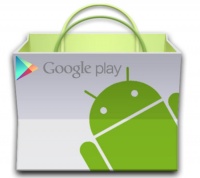Monetization of Google Play: free games with access to operator billing
- Transfer
 Google Play has an undeserved reputation for a platform that does not bring money - however, at least a number of developers of free games oppose this. Companies TinyCo, Spry Fox and Robot Invader claim that the profit with Android is comparable, and sometimes even exceeds the profit from iOS-devices.
Google Play has an undeserved reputation for a platform that does not bring money - however, at least a number of developers of free games oppose this. Companies TinyCo, Spry Fox and Robot Invader claim that the profit with Android is comparable, and sometimes even exceeds the profit from iOS-devices. The difficulty of making money on Google Play is widely known and debated. According to studies by Distimo and Flurry, Google Play makes 1/8 of the profit of the Apple iTunes App Store and its average revenue per user (ARPU, average revenue per user) is only 23% of the income from an iOS user. However, since the Distimo and Flurry reports are based on a very large averaging, not all developers agree with them.
Spry Fox CEO David Edery recently tweeted the company's earnings record on Android. According to Edery, for every dollar earned by the popular Triple Town game on iOS, there are 67 cents on Android. He also noted that this is not a question of a much larger, but less profitable user base for Android - the number of users in iOS and Android versions of Triple Town is almost the same as the conversion rate. Although the game features a greater ARPU in iTunes than on Google Play, Ederi still believes in the future of the Google platform, calling Google Play "a very good source of profit."
Big developers also find many paying users on Google Play. Andreessen Horowitz TinyCo from last week publishedsimilar data - for every dollar that the free Tiny Village on iOS makes, there are 65 cents on Android. If excluding tablets, then this figure rises to 82 cents per dollar. Thus, the TinyCo earnings parameters are very close to the Spry Fox parameters, and not to the Flurry data.
Glu Mobile is another company that speaks of more than analysts show revenues. Although only 30% of Glu’s free-to-play games in Q4 came from Android smartphones, both platforms show roughly equal ARPUs, said Adam Flanders, vice president of sales and marketing. Glu also sees that Android user conversions are constantly improving, for which Google Play should thank for the wider adaptation of purchases through credit cards in the store and the extension of Google Check Out to international telecom operators.
Access to operator billing is an extremely important tool for Android developers with free games, as it allows a user without a credit card to make purchases of digital goods, thereby increasing the conversion of users from free to paid and the level of monetization. Operator billing is one of the key reasons why companies like DeNA can get a conversion rate of 15% in Japan versus 2% in North America. The profitable South Korean market is also the result of carrier billing - Com2uS turns about 10% of users of Android games into payers in South Korea, and only 3% in the USA.
Robot Invader’s Wind-Up Knight makes 60% of its revenue from Google Play, thanks in large part to carrier accounts, says co-founder Chris Prouett. Players of Wind-Up Knight are almost twice as likely to turn into paid on Android than on iOS, and when they turn, they show better ARPU than on iOS - also thanks to carrier billing.
“Android actually has a number of unique features that make it pretty profitable,” he explains. “One of the main functions is integration with billing systems of operators around the world. In some regions (particularly Japan and some European countries), nobody buys anything on the phone with credit cards - everyone wants their purchases to be debited from their mobile account and shown on the statement at the end of the month. ”
In general, the stories of large and small developers suggest that you can make money on Google Play. But the most successful companies make free games for the game that connect to the billing of international operators.
